Sensor Sweep: Alan Moore, Louis L’amour, Conan Pastiches, Robots
Monday , 25, November 2019 Sensor Sweep 5 CommentsSuper Heroes (BBC): Is it embarrassing for adults to like superheroes?  According to Alan Moore – creator of the Watchmen series and widely considered one of the greatest comic book writers – it is. He says superheroes are perfectly fine for 12 or 13-year-olds but adults should think again. “I think the impact of superheroes on popular culture is both tremendously embarrassing and not a little worrying,” he says.
According to Alan Moore – creator of the Watchmen series and widely considered one of the greatest comic book writers – it is. He says superheroes are perfectly fine for 12 or 13-year-olds but adults should think again. “I think the impact of superheroes on popular culture is both tremendously embarrassing and not a little worrying,” he says.
Folklore (The 13th Floor): The ancient lore of the indigenous peoples of  North America are as varied and far-reaching as the continent itself, and unless you’re well-versed in native lore, you might not realize how many of those tales are populated by horrifying spirits, ghosts, witches, demons and monsters… and since we’re in the scare business, we’re going to share the most nightmarish ones with you.
North America are as varied and far-reaching as the continent itself, and unless you’re well-versed in native lore, you might not realize how many of those tales are populated by horrifying spirits, ghosts, witches, demons and monsters… and since we’re in the scare business, we’re going to share the most nightmarish ones with you.
Westerns (Crimereads): Some of the difficulties the fiction magazines were  experiencing were due to a prewar invention: the paperback book. The Western “dime novels” and “railway novels” (so named because they were sold in train stations) of the nineteenth century were early experiments in this form. True success, however, had to wait until the 1930s, when a pair of innovations were introduced: an effective glue strip used to bind the book together and the adoption of a distribution model invented by magazine publishers.
experiencing were due to a prewar invention: the paperback book. The Western “dime novels” and “railway novels” (so named because they were sold in train stations) of the nineteenth century were early experiments in this form. True success, however, had to wait until the 1930s, when a pair of innovations were introduced: an effective glue strip used to bind the book together and the adoption of a distribution model invented by magazine publishers.
Fiction (Goodman Games): What makes those stories pastiche instead of 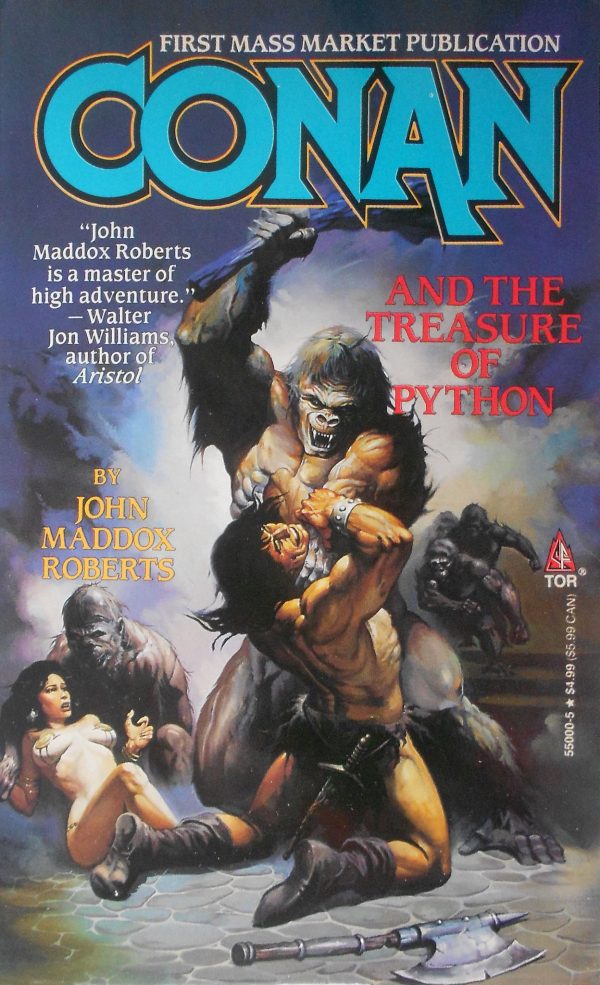 fanfic, I suppose, is that many of these writers were paid to write it and the result was distributed widely. You would assume that meant that the work was well-edited and had some kind of consistency, but a lot of people, me among them, would tell you you’re wrong. Some writers don’t quite get the character, or want to change him, or don’t understand that he actually does change, age to age, and is capable of greater subtlety/humor/intellect than is popularly assumed (just as REH’s writing is more complex than popularly imagined).
fanfic, I suppose, is that many of these writers were paid to write it and the result was distributed widely. You would assume that meant that the work was well-edited and had some kind of consistency, but a lot of people, me among them, would tell you you’re wrong. Some writers don’t quite get the character, or want to change him, or don’t understand that he actually does change, age to age, and is capable of greater subtlety/humor/intellect than is popularly assumed (just as REH’s writing is more complex than popularly imagined).
Men’s Adventure Fiction (Paperback Warrior): “The idea that genre fiction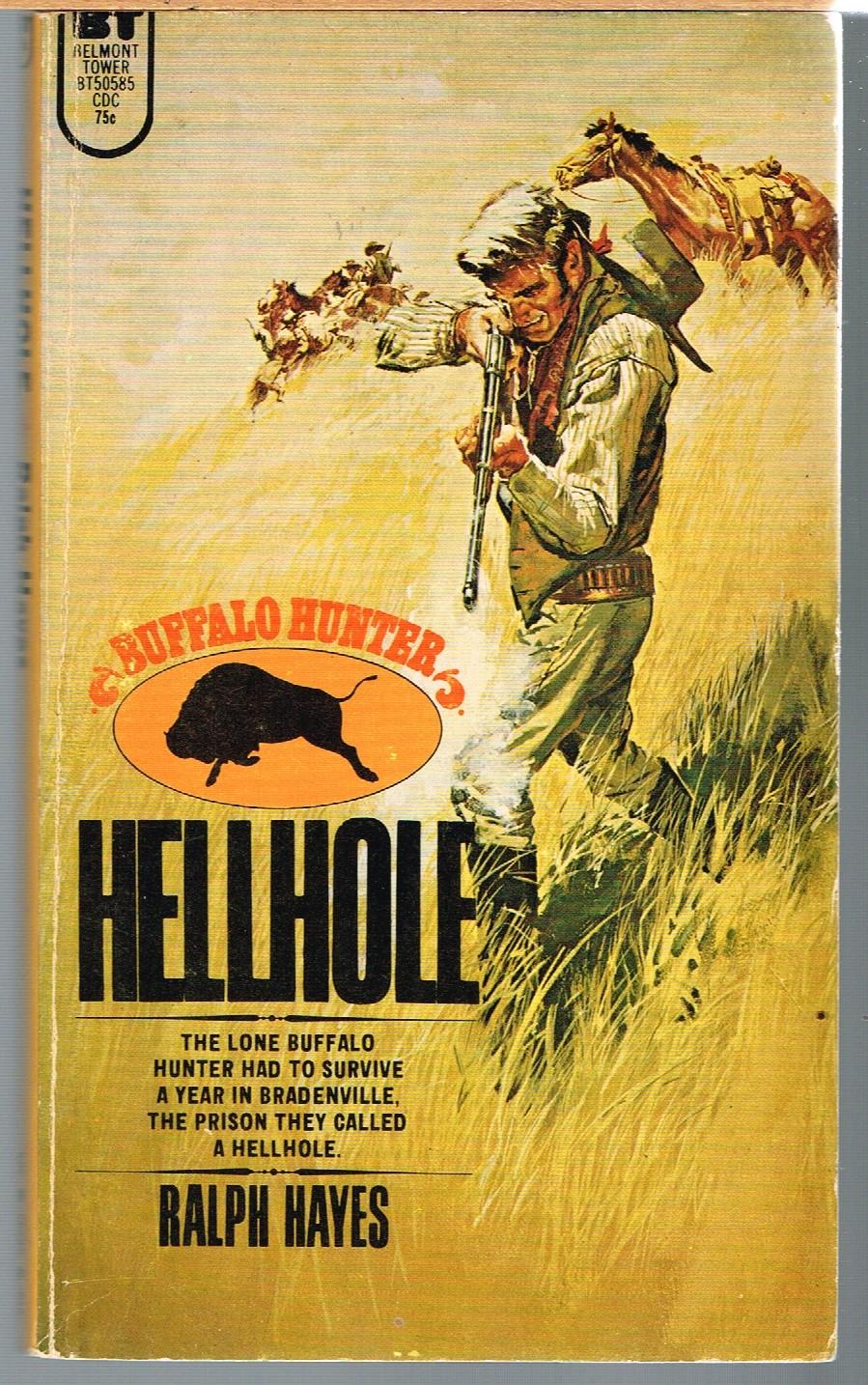 is somehow inferior in quality to so-called mainstream fiction, and is not as literary, is artificial bull-puckey,” Hayes said. “Mainstream also is genre, psychological studies, social issues, etc. are all genres, and most of that is not as entertaining as other genres. Entertainment is the primary objective of all fiction, the other, lesser goal being enlightenment, which should never dominate the story. If you have a cause to espouse, the proper literary form is an essay or a non-fictional book.”
is somehow inferior in quality to so-called mainstream fiction, and is not as literary, is artificial bull-puckey,” Hayes said. “Mainstream also is genre, psychological studies, social issues, etc. are all genres, and most of that is not as entertaining as other genres. Entertainment is the primary objective of all fiction, the other, lesser goal being enlightenment, which should never dominate the story. If you have a cause to espouse, the proper literary form is an essay or a non-fictional book.”
Pulp Magazines (Dark Worlds Quarterly): I’ve been spending a lot of time amongst the Pulps lately. And it begs the question: what is the appeal of these old, flaking, brown books? One thing strikes me immediately, the collector’s mania that says, “I want them all!” Since Pulp magazines are no longer produced it is a finite proposition to own a “complete Weird Tales” if not a cheap one. But this doesn’t explain everything. The idea of a rare magazine or comic sealed in plastic, unreadable, priced at, say, $1000.00, makes it no more interesting than a rare coin or a bearer bond.
SF RPG (Trollsmyth): Treasure is easy in fantasy realms. Usually, it’s great piles of gold coins, gleaming gems, and works of art. Back in the middle of the 20th century, when the future was nuclear, space powers feuded over fissionables the way 20th century powers fought over oil. Later, when the power of the future shifted from fission to fusion, He3 became the thing to fight over.
A. Merritt (DMR Books): What a difference a century makes, eh? A well-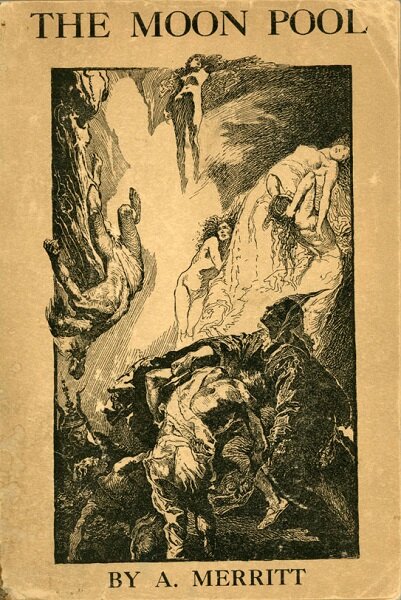 respected book reviewer for “The Newspaper of Record” published that glowing endorsement for the very first hardcover edition of A. Merritt’s The Moon Pool. As I’ve explained elsewhere, the book itself was a “fix-up” novel merging Merritt’s original novelette of “The Moon Pool” with the novella/short novel, “The Conquest of the Moon Pool”. Let’s see what else the reviewer has to say…
respected book reviewer for “The Newspaper of Record” published that glowing endorsement for the very first hardcover edition of A. Merritt’s The Moon Pool. As I’ve explained elsewhere, the book itself was a “fix-up” novel merging Merritt’s original novelette of “The Moon Pool” with the novella/short novel, “The Conquest of the Moon Pool”. Let’s see what else the reviewer has to say…
Pulp Fiction (Grey Dog Tales): This book opens with an excellent and very 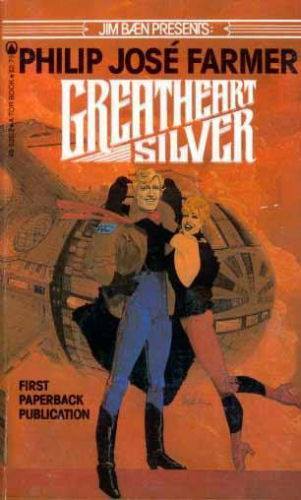 informative introduction by Garyn G. Roberts Ph.D., in which he gives a very detailed background of Farmer’s love for and relationship with Pulp fiction. Without wanting to repeat too much of the information in that introduction, it’s worth mentioning here that Greatheart Silver was Farmer’s homage to the great pulp heroes of the 1930s.
informative introduction by Garyn G. Roberts Ph.D., in which he gives a very detailed background of Farmer’s love for and relationship with Pulp fiction. Without wanting to repeat too much of the information in that introduction, it’s worth mentioning here that Greatheart Silver was Farmer’s homage to the great pulp heroes of the 1930s.
Gaming (Jeffro’s Space Gaming Blog): Long, long ago I heard rumor of them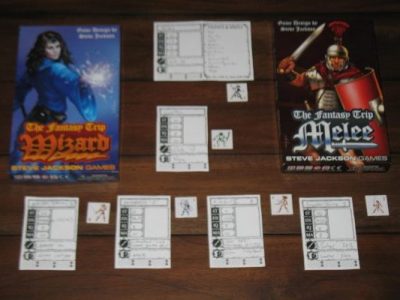 in the introduction of GURPS. Elements of Melee and Wizard are of course baked into the classic Second Edition GURPS Basic Set and first edition GURPS Fantasy. But strangely enough, the group of high school buddies that went hog wild playing Car Wars and Ogre and Illuminati somehow never went beyond doing anything else beyond creating a few 100 point characters with those gaming materials that were supposed to be Steve Jackson’s magnum opus and the ultimate testament to his design genius.
in the introduction of GURPS. Elements of Melee and Wizard are of course baked into the classic Second Edition GURPS Basic Set and first edition GURPS Fantasy. But strangely enough, the group of high school buddies that went hog wild playing Car Wars and Ogre and Illuminati somehow never went beyond doing anything else beyond creating a few 100 point characters with those gaming materials that were supposed to be Steve Jackson’s magnum opus and the ultimate testament to his design genius.
H. P. Lovecraft (Slashfilm): During an interview with Coming Soon,  SpectreVision’s Elijah Wood and Daniel Noah revealed tentative plans for a Lovecraft trilogy, adding that Color Out of Space director Richard Stanely might be involved as well. Wood and Noah said that if there’s “enough of an appetite for these things, and we can keep them going and make at least three of them” because Lovecraft is “such an important voice in horror.”
SpectreVision’s Elijah Wood and Daniel Noah revealed tentative plans for a Lovecraft trilogy, adding that Color Out of Space director Richard Stanely might be involved as well. Wood and Noah said that if there’s “enough of an appetite for these things, and we can keep them going and make at least three of them” because Lovecraft is “such an important voice in horror.”
Folklore (Blog That Time Forgot): Ah, that most feared & beloved of Scottish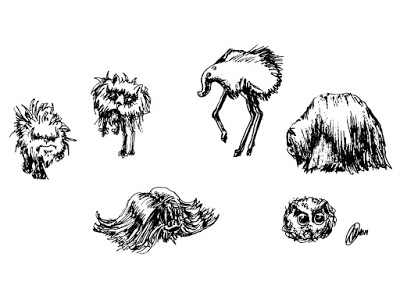 beasties, the Wild Haggis. Elusive yet ubiquitous, they’re rare enough to be seldom seen in the wild, yet populous enough to feed 5.4 million Scots every Burns’ Night. Some say they are small furry mammals, others that they are little birds with vestigial wings; some say their right (or left) legs are longer than the others to facilitate mountain navigation at the cost of reproductive opportunity, while others suppose that they have only three legs, or even no legs at all; there are those who compare their call with the drone of the bagpipes, and others who equate it with a whistly twittering.
beasties, the Wild Haggis. Elusive yet ubiquitous, they’re rare enough to be seldom seen in the wild, yet populous enough to feed 5.4 million Scots every Burns’ Night. Some say they are small furry mammals, others that they are little birds with vestigial wings; some say their right (or left) legs are longer than the others to facilitate mountain navigation at the cost of reproductive opportunity, while others suppose that they have only three legs, or even no legs at all; there are those who compare their call with the drone of the bagpipes, and others who equate it with a whistly twittering.
Small Press (Rawle Nyanzi): There’s a particular short story magazine that  chugs along like a little engine that could. In spite of financial challenges and some less-than-stellar sales figures, it keeps on keeping on through periodic crowdfunds and targeted marketing. I’m talking about Cirsova, the Magazine of Thrilling Adventure and Daring Suspense, founded in 2016 by P. Alexander, a Twitter buddy of mine who did the interior formatting for both of my novels Sword & Flower and Shining Tomorrow.
chugs along like a little engine that could. In spite of financial challenges and some less-than-stellar sales figures, it keeps on keeping on through periodic crowdfunds and targeted marketing. I’m talking about Cirsova, the Magazine of Thrilling Adventure and Daring Suspense, founded in 2016 by P. Alexander, a Twitter buddy of mine who did the interior formatting for both of my novels Sword & Flower and Shining Tomorrow.
RPG (Goodman Games): The third book in the Alphabet series is now ready for pre-order! The Cthulhu Alphabet is an organized book of madness that you can incorporate into any role-playing game, Dungeon Crawl Classics or otherwise! The Cthulhu Alphabet is a collection of random tables to inspire your role-playing game, structured around an abecedarian theme. If you are a player navigating an uncaring universe, a haunted setting, or a horror-filled dungeon, you will find new ideas for your character and adventures.
Tolkien (Tolkien and Fantasy): I’m using the term “Tolkienian resonances” in this post’s title to refer to some things that predate Tolkien’s own relevant works, but are certainly not influences. They could perhaps be called precursors, but that seems too expansive a term. In any case, a few of these works with such resonances are interesting, and I recount them here. First, there is the discovery by Mark Hooker of the poem “The Orc and His Globular Island.” Hooker wrote about it in the November 2019 issue of Beyond Bree. The poem is interesting not only for its use of the word orc, but for the orc’s similarities to Gollum in The Hobbit.
H. P. Lovecraft (Sacnoth’s Scriptorium): Despite enjoying him as a good read, Lovecraft left Williams out of SUPERNATURAL HORROR IN LITERATURE, his monograph surveying the field, which he was expanding and revising at the time. Doubtless Williams did not make the final cut because Lovecraft had concluded that CW was really not a horror writer at all and also that only committed Xians wd fully appreciate these novels (Lovecraft himself was an atheist and nihilist).
Tarzan (DMR Books): As I stated this time last year, a significant portion of 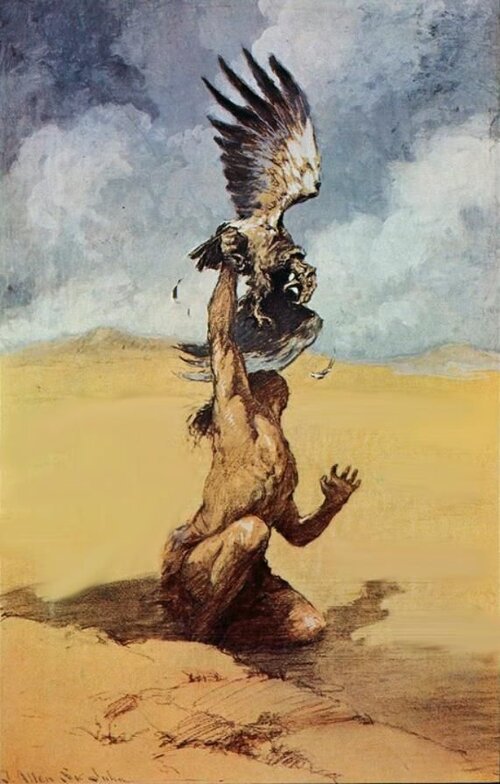 Tarzan fandom considers November 22 to be the ape-lord’s “real” birthday. That’s fine with me. It makes a perfectly good excuse to talk about my favorite works of Tarzanic art. I considered going through my faves in the order I first discovered them, but it was long enough ago—and much of it was in a fairly short span of time—that I decided to go chronologically as they were first published. Thus, the iconic cover for the first McClurg edition of Tarzan of the Apes has to start things out.
Tarzan fandom considers November 22 to be the ape-lord’s “real” birthday. That’s fine with me. It makes a perfectly good excuse to talk about my favorite works of Tarzanic art. I considered going through my faves in the order I first discovered them, but it was long enough ago—and much of it was in a fairly short span of time—that I decided to go chronologically as they were first published. Thus, the iconic cover for the first McClurg edition of Tarzan of the Apes has to start things out.
Pulp Art (Dark Worlds Quarterly): The first Pulp magazine to offer robot  stories was not a purely Science Fiction mag but Weird Tales, which featured the first robotic brain, giant robots and robot despots in Edmond Hamilton’s “The Metal Giants” and Ray Cummings’ “The Robot God”.
stories was not a purely Science Fiction mag but Weird Tales, which featured the first robotic brain, giant robots and robot despots in Edmond Hamilton’s “The Metal Giants” and Ray Cummings’ “The Robot God”.
Fiction (Don Herron): The other day Brian Leno mentioned that he’d heard 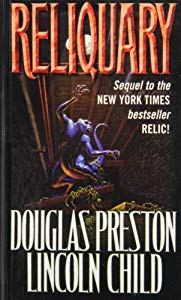 good things about the novel Relic by Preston & Child — but even more specifically, he got the major tip-off from me. I found the novel much, much better than the movie and could not believe that the movie cut out the role of Pendergast, an FBI guy who for all practical purposes may as well be Sherlock Holmes. My god, the best character. I could not believe it, and I still cannot believe it — who’d buy rights to The Hound of the Baskervilles and then delete Sherlock? What genius does that?
good things about the novel Relic by Preston & Child — but even more specifically, he got the major tip-off from me. I found the novel much, much better than the movie and could not believe that the movie cut out the role of Pendergast, an FBI guy who for all practical purposes may as well be Sherlock Holmes. My god, the best character. I could not believe it, and I still cannot believe it — who’d buy rights to The Hound of the Baskervilles and then delete Sherlock? What genius does that?
Ian Fleming (Mystery File): Thunderball was the eighth James Bond novel 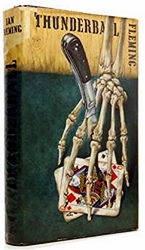 and followed a break after Goldfinger where the new James Bond had been a collection of short stories, For Your Eyes Only. In fact Thunderball was the result of the author’s dwindling enthusiasm for his creation after a series of bitter disappointments about Bond’s screen fortunes. A proposed Hitchcock film of From Russia With Love had fallen through (Hitchcock ended up doing North by Northwest instead), and while sales for the Bond novels had rocketed with Doctor No and Goldfinger, the television series pilot “Commander Jamaica” that fell through had become the plot of Doctor No.
and followed a break after Goldfinger where the new James Bond had been a collection of short stories, For Your Eyes Only. In fact Thunderball was the result of the author’s dwindling enthusiasm for his creation after a series of bitter disappointments about Bond’s screen fortunes. A proposed Hitchcock film of From Russia With Love had fallen through (Hitchcock ended up doing North by Northwest instead), and while sales for the Bond novels had rocketed with Doctor No and Goldfinger, the television series pilot “Commander Jamaica” that fell through had become the plot of Doctor No.
Weapons (Pulp Rev): Swords are cool. That alone would be enough reason to include swords in fiction. And you can’t have a street samurai without a sword. But my preferred aesthetic, that of the military technothriller, demands greater justification than just ‘cool’. And for good reason: soldiers must justify every piece of gear they carry on a mission. Unnecessary gear just slows you down and takes up space.
I’m rather curious as to what has prompted more to arrive at that ex abrupto?
What exactly is embarassing about liking superheros as an adult?
The only conclusion I can arrive at is that he’s anti virtue.
xavier
Since Mr. Moore’s own work in the genre can hardly be described as fit for children, we can call this virtue signaling. He wants to be pals with the current crop of woke folk, so he tells them what he thinks they want to hear.
Some very cool articles on L’Amour, Native American legends and the Wild Haggis. Thanks!
The post about Philip Jose Farmer’s Greatheart Silver should be a must-read for those looking into the deep history of “New Pulp” and the various pulp revivals. PJF was absolutely instrumental in educating lots of young readers (including me) about the various pulp heroes from the Golden Age.
Another cool post from Cheah. I was hoping he’d write one on blades/swords.
Anyone who’s ever read Relic has complained about how the movie cut Pendergast out of it, and it looks even dumber now because Preston and Child basically made him the center of their shared universe of stories, so Hollywood missed out on a potentially vast franchise. I suspect the reason the filmmakers deleted him is because Pendergast is an aristocratic and highly intellectual albino Southern man and it galled them to think of someone like that going around being so much smarter than New Yorkers.
Glad to see the link giving Preston and Child some recognition.
Those guys have been turning out great pulpy adventures for a long time.